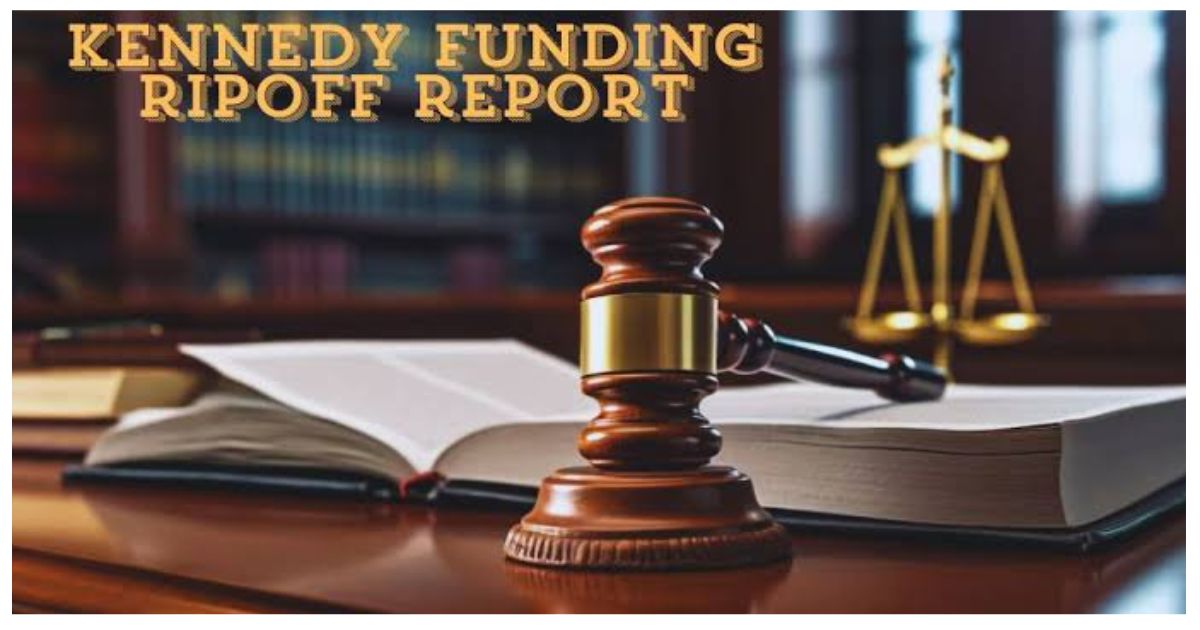When it comes to hard-money lending, kennedy funding ripoff report is a well-known player in the industry, catering to those who may not qualify for conventional financing. However, like any prominent lender, Kennedy Funding has faced both acclaim and scrutiny, with numerous online “ripoff reports” questioning its practices. This article dives into the essential aspects of Kennedy Funding, including the services they offer, potential red flags, and steps borrowers can take to navigate hard-money loans safely. Understanding these aspects will help potential borrowers make informed decisions, assess risk, and better grasp how to approach alternative lenders.
kennedy funding ripoff report’s Background and Mission
kennedy funding ripoff report was founded to offer hard-money loans to clients needing immediate financing for real estate projects. Unlike traditional lenders, Kennedy Funding offers more flexible loan terms to suit clients who may not qualify for bank loans. Their primary mission is to facilitate projects by providing timely funding, especially for complex, high-risk investment.
What Sets Kennedy Funding Apart?
One of the distinguishing factors of Kennedy Funding is its approach to asset-based lending. They prioritize the value of collateral—mainly real estate assets—rather than focusing solely on the borrower’s credit history. This method can be beneficial to investors with less-than-ideal credit scores or those pursuing unconventional real estate investments, as it enables a quicker and easier loan approval process compared to traditional banks.
Understanding Ripoff Reports and Their Impact
Ripoff reports are a form of consumer complaint typically posted online to share negative experiences about a business or service. These reports can have a profound impact on a company’s reputation, affecting both public perception and client trust. Ripoff reports on Kennedy Funding have ranged from alleged misleading practices to dissatisfaction with loan terms. Reading these reports carefully can be critical in forming an objective viewpoint and making well-rounded financial decisions.
Common Allegations in Kennedy Funding Ripoff Reports
A recurring theme among Kennedy Funding’s ripoff reports includes concerns over hidden fees, high-interest rates, and confusion surrounding loan terms. Some borrowers claim they felt misled by certain clauses in loan agreements or surprised by additional costs during the loan process. These complaints often highlight the importance of clear communication between the lender and borrower and emphasize the necessity for borrowers to fully understand the contract terms.
Evaluating Loan Terms and Conditions
One of the first steps to avoid misunderstandings is to evaluate Kennedy Funding’s loan terms and conditions meticulously. Hard-money loans are known for having higher interest rates, shorter terms, and potentially stricter terms than traditional loans. Borrowers should be aware of these factors to avoid any “hidden” surprises later on. Understanding factors such as prepayment penalties, fees for late payments, and default conditions is essential for a clear financial strategy.
Transparency in the Hard-Money Loan Industry
Transparency is a crucial aspect when dealing with hard-money loans. Some ripoff reports allege a lack of clear disclosure of interest rates, fees, or conditions, which can be a red flag for borrowers. To mitigate such risks, always request a detailed breakdown of all costs associated with the loan. Borrowers should not hesitate to ask for clarification on terms they do not understand, as hard-money lending practices can be more complex than standard mortgage agreements.
Reviewing Interest Rates and Fees
One of the most common complaints among ripoff reports revolves around the high interest rates and fees charged by hard-money lenders like Kennedy Funding. Although hard-money loans tend to have higher rates due to the increased risk to lenders, borrowers should shop around to understand the industry standard. Comparing Kennedy Funding’s rates with those of other lenders can help borrowers determine if the terms are reasonable or if the company’s practices are unusually expensive.
Conducting a Detailed Background Check
Before committing to a loan, borrowers are encouraged to conduct a background check on Kennedy Funding. This includes researching the company’s track record, client feedback, and any ongoing legal disputes. Platforms like the Better Business Bureau (BBB) provide valuable insights into customer experiences and overall business practices. By conducting thorough due diligence, borrowers can avoid lenders with a history of unresolved complaints or concerning business practices.
Seeking Legal Advice Before Signing
Given the high financial stakes involved, seeking legal counsel before signing a loan agreement with kennedy funding ripoff report is a wise move. A legal professional with experience in hard-money loans can help review the terms, clarify confusing language, and ensure the borrower is fully aware of their obligations. Legal guidance can be invaluable in identifying unfavorable terms or hidden clauses that may lead to complications down the line.
Identifying Red Flags in Loan Agreements
Ripoff reports about Kennedy Funding often mention unexpected fees or changes in terms, which can be indicative of red flags. These might include excessive penalties for early payment, vague clauses about interest adjustments, or sudden changes in loan conditions. Understanding these red flags can protect borrowers from unforeseen expenses or contract breaches. Before signing, ask specific questions about these aspects to clarify the terms.
Working with Reputable Lenders
Borrowers exploring the hard-money lending market should prioritize working with reputable lenders. Reviews, testimonials, and official certifications can shed light on a lender’s credibility. As the ripoff reports illustrate, a lack of transparency or poor client communication can harm the borrower’s financial situation. Opting for lenders with solid reputations can mitigate the risks associated with hard-money loans and enhance the overall experience.
Comparing Kennedy Funding to Competitors
Understanding how Kennedy Funding’s terms and services compare to those of other hard-money lenders can provide additional clarity. Evaluate interest rates, fees, loan processing times, and client satisfaction to determine if Kennedy Funding offers a competitive advantage. A thorough comparison can reveal if Kennedy Funding’s practices align with industry standards or if there are more favorable options available.
Why Borrowers Should Prioritize Documentation
Maintaining detailed records of all communications, agreements, and loan documents is essential for hard-money loan transactions. In case of disputes, having clear documentation can protect borrowers, providing evidence in instances where terms or conditions may have been misrepresented. Prioritizing documentation allows borrowers to have a solid foundation in case of discrepancies or unexpected fees.
Understanding the Role of Hard-Money Loans in Real Estate
Hard-money loans, like those offered by Kennedy Funding, play a significant role in real estate development and investment. These loans are especially useful for investors in need of quick capital, but the high costs and shorter repayment terms require careful planning. Understanding how these loans function and the risks involved can help borrowers make strategic choices for their real estate ventures.
Protecting Yourself as a Borrower
To protect yourself from potential ripoffs, be proactive about seeking information, asking questions, and ensuring you fully understand the terms before entering into a loan agreement with Kennedy Funding. Transparency, documentation, and legal advice are critical elements in safeguarding your interests and mitigating potential financial setbacks.
Conclusion
kennedy funding ripoff report offers valuable financial solutions for those needing immediate funds for real estate projects. However, ripoff reports suggest the importance of vigilance, thorough research, and transparency in navigating hard-money loans with Kennedy Funding or any alternative lender. As with any substantial financial commitment, understanding the loan terms, comparing options, and securing legal guidance can significantly reduce risks. By approaching hard-money loans with a well-prepared mindset, borrowers can use these resources to their advantage while avoiding potential pitfalls.
FAQs
What is a hard-money loan?
A hard-money loan is a type of asset-based loan primarily used in real estate, often requiring property as collateral rather than relying on credit scores.
Why does Kennedy Funding face ripoff reports?
Complaints generally relate to fees, high-interest rates, and misunderstandings over loan terms. Borrowers are encouraged to scrutinize terms closely before agreeing.
How can I ensure transparency with Kennedy Funding?
Request detailed information on all fees and terms, and keep thorough records. Don’t hesitate to ask questions or seek legal advice for clarity.
Are hard-money loans more expensive than traditional loans?
Yes, hard-money loans typically have higher interest rates and fees due to the increased risk lenders take on, especially with borrowers who may not qualify for conventional loans.
Is legal advice necessary for hard-money loans?
While not required, legal advice can provide valuable insights into the contract terms, helping borrowers avoid unexpected costs or conditions.







